Movies to watch this week at the cinema: Black Panther, The Shape of Water, and more
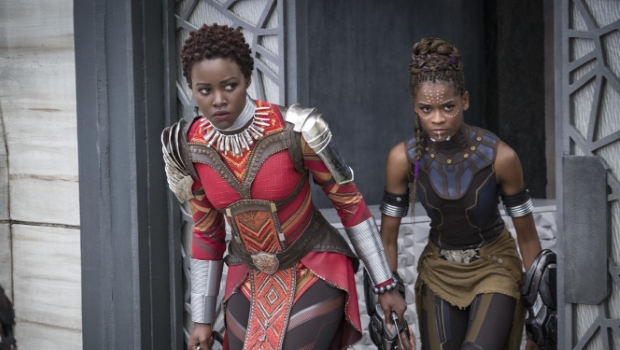
Out on Friday February 16
Ryan Coogler's confident, assured and athletic superhero movie. Guillermo del Toro's timeless, fantastical and forceful fable of outsider love. Greta Gerwig's smart, funny and emotional coming-of-ager.
Yes, here's this week's new releases. Click on for our reviews of Black Panther, The Shape of Water, Lady Bird, Father Figures, and You Have No Idea How Much I Love You.
For the best movie reviews, subscribe to Total Film.
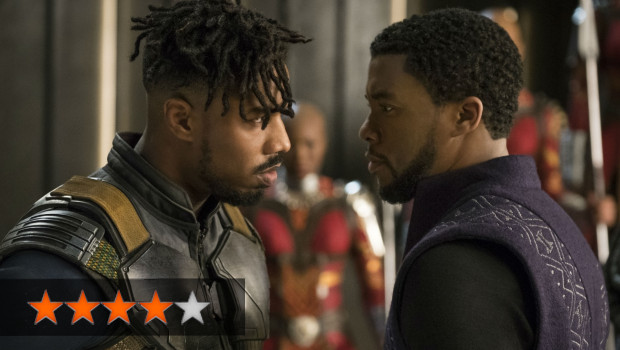
Black Panther
“It’s hard for a good man to be a king.” Spoken in a mystical dream, these words resonate across Ryan Coogler’s splendid Black Panther, the MCU’s 18th movie – and its first one centred on a superhero of African origin. What it means to be a leader is a crucial theme in this stand-alone adventure for T’Challa (Chadwick Boseman), the sovereign-in-waiting of the fictional (and highly advanced) nation of Wakanda.
We already know Black Panther will be back in the imminent Avengers: Infinity War, but here we dig into the origin stories of both the character and his country. Coogler (Fruitvale, Creed) and his co-writer Joe Robert Cole set the story, naturally, after the events of Captain America: Civil War, where T’Challa’s father, T’Chaka (John Kani) was killed in a bombing orchestrated by Helmut Zero.
Before we even get to the credits, Coogler gives us a potted history of Wakanda. This African paradise boasts the much-desirable Vibranium, the strongest metal on earth (sorry, Adamantium), which has allowed the Wakandan people to develop highly sophisticated tech. And yet T’Chaka kept his kingdom hidden away, refusing to share its secrets. As T’Challa is later told, “You can’t let your father’s mistakes define who you are.”
The first third of the movie takes its time, with T’Challa forced to battle, literally, for his father’s throne – in a beautifully shot fight sequence on the edge of a waterfall – and become the so-called Black Panther. With the athleticism of Black Widow and a suit cooler than Iron Man’s, he’s an admirable fighter. But he’ll need more than combat skills in a globe-trotting plot that begins in London, where Age of Ultron mercenary Ulysses Klaue (Andy Serkis, having a ball) steals a Vibranium artefact.
It’s this theft that leads T’Challa to Busan to intercept Klaue, as the latter meets with CIA official Everett K Ross (Martin Freeman) to trade his bounty. Cue a stand-out sequence – the South Korean city looks so vibrant on film – that whizzes from a casino-set smackdown to a stunning through-the-streets chase. And Coogler brings the funny, too: one sight gag, involving a car seat and steering wheel, would do silent-comedy king Harold Lloyd proud.
As well as breaking ground with its African focus, Black Panther also avoids being another superhero sausage-fest. Nakia (Lupita Nyong’o) and Okoye (Danai Gurira), the head of the Dora Milaje – T’Challa’s all-female kickass bodyguard team – are notably defined. But the most fun is had by T’Challa’s 16-year-old sister, Shuri (Letitia Wright) a gadget-master who’s Q to Black Panther’s 007 (Tony Stark should employ her immediately).
Then there’s Erik ‘Killmonger’ Stevens (Michael B. Jordan), a renegade Black Ops soldier of Wakandan descent who has vengeance and violence on his agenda. He’s but one of a lip-smacking pool of talent that includes Angela Bassett, Forest Whittaker and Get Out Oscar nominee Daniel Kaluuya. The extensive ensemble is very much led from the front by Boseman, an intellectually and physically agile performer who simply rocks as Black Panther.
Running 134 minutes, it flags in places; the finale in particular could use some trimming. But throughout, Coogler keeps an ambitious number of balls in the air. Whether the movie will prove a watershed moment for diversity in Hollywood blockbusters remains to be seen. There’s little doubt, though, that the director has a serious claw-hold on scale and spectacle.
THE VERDICT: Confident, assured and athletic filmmaking. And with Boseman on such dignified, dynamic form, his Infinity War return can’t come soon enough.
Director: Ryan Coogler; Starring: Chadwick Boseman, Michael B. Jordan, Lupita Nyong’o, Danai Gurira, Angela Bassett, Daniel Kaluuya, John Kani, Letitia Wright, Andy Serkis; Theatrical release: February 13, 2018
James Mottram
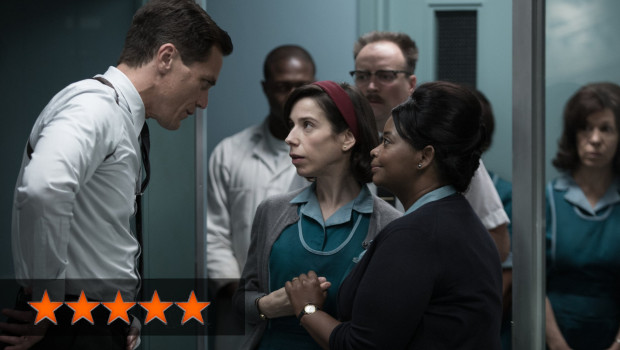
The Shape of Water
Even before you factor in his love for ghosts, fauns and kaiju, thick currents of feeling have always run through Guillermo del Toro’s finest films. Consider Federico Luppi’s poetic longings in The Devil’s Backbone, Hellboy’s love for Selma Blair’s Liz Sherman, or the weeping heart of innocence lost in Pan’s Labyrinth. It’s no strain to call del Toro’s films love letters to cinema, either. At best, they double as declarations of devotion to the belief that film can seduce and transform across boundaries.
Those rivers of feeling overflow in his tenth film, an impassioned musical romance brimming with evidence of deep directorial conviction. True, recent del Toro workouts Pacific Rim and Crimson Peak also stretched beyond their monster-movie and melodrama roots thanks to his unfiltered investment. But The Shape of Water is the director at his purest, surfacing as an English-language (and sign-language) extension of Backbone and Pan in its fulsomely imagined period allegory of outsiders resisting the tide of historical oppression.
For Backbone’s orphan hero and Pan’s inquisitive Ofelia, substitute Sally Hawkins’ mute Elisa, a lonely but life-loving cleaner who lives above an old-school film palace in 1962 Baltimore and finds escape in movies, music and moments of bathtub bliss. Meanwhile, her outsider bonds with potty-mouthed fellow cleaner Zelda (Octavia Spencer) and gay neighbour Giles (Richard Jenkins) receive full expression in del Toro and Vanessa Taylor’s character-rich script.
At another extreme sits Colonel Strickland (Michael Shannon), who we meet as he delivers an ‘asset’ for containment to the government facility where Elisa and Zelda work: a creature (Doug Jones) from a black lagoon, deemed to be of Cold War interest.
After a shocking, bloody episode reveals our amphibi-man enjoys neither imprisonment nor torture, Elisa forms a bond with him based on Benny Goodman records and hard-boiled eggs. Soon, aided by sensitive scientist Dr. Hoffstetler (Michael Stuhlbarg) and pals, she hatches a plan to bust the creature free: and Strickland isn’t the kind to pay enough attention to ‘the help’ to see the plan coming.
A kind of renegade fairytale romance ensues, though this being del Toro, it ensues in extravagantly wrought fashion. Never mind that the plot points can be semi-predictable; fairytales often are. What’s more vital is the poetic potency with which del Toro frames the transformative, language-leaping bond between a wounded fish-fella and a scarred woman who has, finally, found someone who doesn’t look through her.
It also helps that Hawkins is on peak form. In her richest role since Happy-Go-Lucky, she communicates non-verbal feeling with an unforced charm that never dampens the longings below. Don’t let the faint echoes of Amélie dupe you: Hawkins and del Toro ensure her feelings run truer than any burped up in Jean-Pierre Jeunet’s whimsical hit.
Jones projects similar forces of feeling through the scales and tactile grunts of the gill-man, his animal nature honoured yet never diluted for smooth consumption. After Universal’s botched monster-movie revivals, this is a monster done right, red of tooth, claw and heart: and should any Blade II fans fear del Toro has gone soft, let’s just say the creature’s hunger observes no pet-based pieties.
Also on boundary-busting duty is Spencer, who vigorously channels the spirits of classic Hollywood romance’s barbed best pals – with added knob jokes. And Jenkins brings a worldly-wise poignancy to Giles, whose crush on a waiter sparks a persuasive portrait of period prejudice.
That bigotry erupts in Strickland, G-man to Jones’ gill-man. With oiled hair and ominous cheekbones lit from below, Strickland would verge on noir-heavy cliché were it not for Shannon’s seething menace and del Toro’s understanding of his character type. A creature of his Cold War times, Strickland is the American successor to Backbone’s grasping proto-fascist Jacinto and Pan’s full-bore fascist Vidal; he bleeds like them, too. And any hints of Trump-era resonances are, surely, fully intended.
The result is a full-blooded fable of outsider love that’s at once timely and timeless, fantastical and forceful, its every tonal swing matched in substance and style. Del Toro’s intuitive direction navigates the tides between matters of the heart and monsters of history with fluid power, buoyed by the swoon and lunge of Alexandre Desplat’s lavish score.
Meanwhile, DoP Dan Laustsen’s sumptuous images relish every inch of Paul D. Austerberry’s immersive production designs, from Elisa’s home to the movie theatre below. In one scene, the gill-man stands before that cinema screen, transported. In del Toro’s hands, we know exactly how he feels.
THE VERDICT: Del Toro’s Valentine to boundary-crossing love pours from the screen in ravishing torrents of feeling and style. And Hawkins is sublime.
Director: Guillermo del Toro; Theatrical release: Sally Hawkins, Michael Shannon, Richard Jenkins, Doug Jones, Octavia Spencer, Timothée Chalamet; Theatrical release: February 14, 2018
Kevin Harley
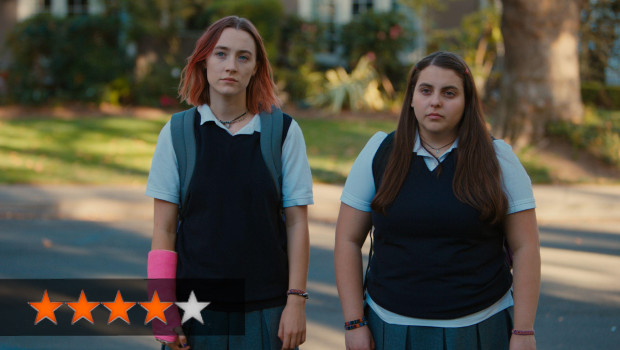
Lady Bird
For one hot second, Lady Bird was ranked 100 per cent fresh on Rotten Tomatoes, breaking Toy Story 2’s record as the best-reviewed flick in the site’s history. Of course – as T-Swift might say – haters gonna hate, so that streak is now blemished. But it’s testament to the universal appeal of this deft and moving bildungsroman, which takes a well-worn genre and delivers a near-perfect refresh brimming with brio, tenderness and authenticity.
It’s a film informed by writer/director Greta Gerwig’s own sleepy-town, Catholic-infused adolescence. Saoirse Ronan plays the titular 17-year-old, who bemoans her lower-middle-class existence in 2002 Sacramento. Lady Bird yearns for the perceived ‘culture’ of the East Coast, romance and an escape from her nagging mum (Laurie Metcalf) – while navigating college applications, cherry-popping and the complexities of friendship.
As scripted by Gerwig (nailing teen cadence) and toplined by a never-better Ronan, Lady Bird is a delicious, recognisable creature of contradictions: pretentious and sweet, blind-sided and clear-eyed, a cliché and a firebrand. She rages against the parental machine without understanding the tax of adulthood, beautifully illustrated by Metcalf’s pragmatic cancer nurse mum and Tracy Letts’ depressed, laid-off dad. She’s determined to lose that pesky virginity to one of two suitors; Lucas Hedges’ confused posh boy Danny, or Timothée Chalamet’s vapid cool guy Kyle. And she’s working out the merits of true sisterhood versus schoolroom social climbing.
If this all sounds like any number of high-school flicks, you’re not wrong. But while Gerwig isn’t reinventing the wheel, she is redefining it for a wider audience. Nuanced enough to feel effervescent and effortless, this precision-crafted screenplay takes in nostalgia, class, the American Dream, mental health, sexual orientation and the healing properties of having a good cry while eating an entire cheese.
It’s unflinching, but never snide. We’re invited to laugh at Lady Bird’s plain annoying tendencies as well as Kyle’s teen-hustler dickish moves (“You’re going to have sooo much un-special sex”) without judgement. And Sacramento is lensed in such an affectionate and wondrous way to render it arthouse beautiful.
Everyone from Lois Smith’s twinkly, realist nun to Metcalf’s loving buzz-kill are on their A-game. But the film naturally belongs to Ronan, who seduces viewers with a performance of such unvarnished truth and raw emotion that you’ll be rooting hard for her to one day find that ‘special’ sex in the East Village she so naïvely craves. Hella good.
THE VERDICT: Smart, funny and emotional, Lady Bird is a Trojan horse movie – sneaking its way into hearts and minds via well-worn tropes.
Director: Greta Gerwig; Theatrical release: Saoirse Ronan, Laurie Metcalf, Tracy Letts, Timothée Chalamet; Theatrical release: February 16, 2018
Jane Crowther
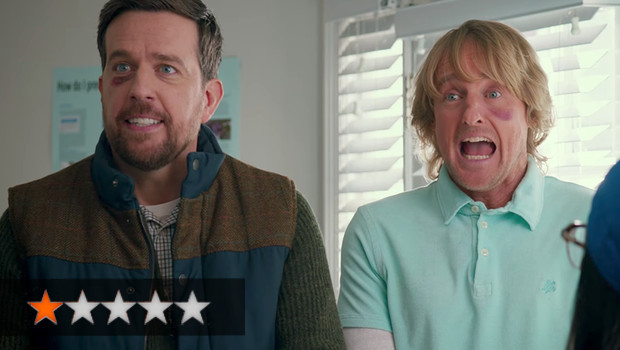
Father Figures
Owen Wilson and Ed Helms are brothers on a road trip to find their father after mum Glenn Close reveals she lied about his death. They meet a bunch of idiots on the way. The end.
The directorial debut of Hangover cinematographer Lawrence Sher, this is a loathsome wasteland of a comedy, ping-ponging desperately from raunch to cloying sentiment. If you’re looking for laughs, look elsewhere.
Director: Lawrence Sher; Theatrical release: Owen Wilson, Ed Helms, Glenn Close; Theatrical release: February 16, 2018
Ken McIntyre
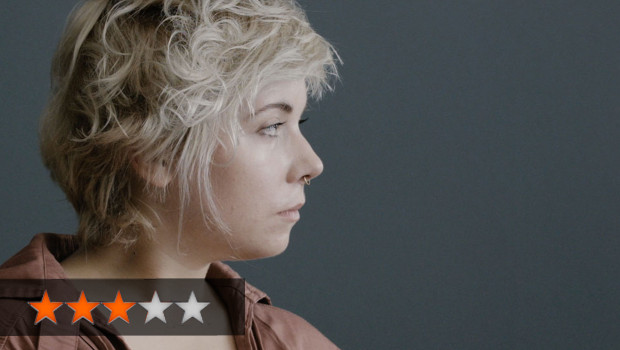
You Have No Idea How Much I Love You
Playing out as a series of therapy sessions, Pawel Lozinski’s docudrama largely consists of close-ups of a mother and daughter and the counsellor trying to mediate between them. Although the film lacks cinematic scope, it offers a raw emotional honesty.
Pity, then, that a post-credits revelation somewhat cheapens all that has gone before.
Director: Pawel Lozinski; Theatrical release: February 16, 2018
Tim Coleman
The Total Film team are made up of the finest minds in all of film journalism. They are: Editor Jane Crowther, Deputy Editor Matt Maytum, Reviews Ed Matthew Leyland, News Editor Jordan Farley, and Online Editor Emily Murray. Expect exclusive news, reviews, features, and more from the team behind the smarter movie magazine.


